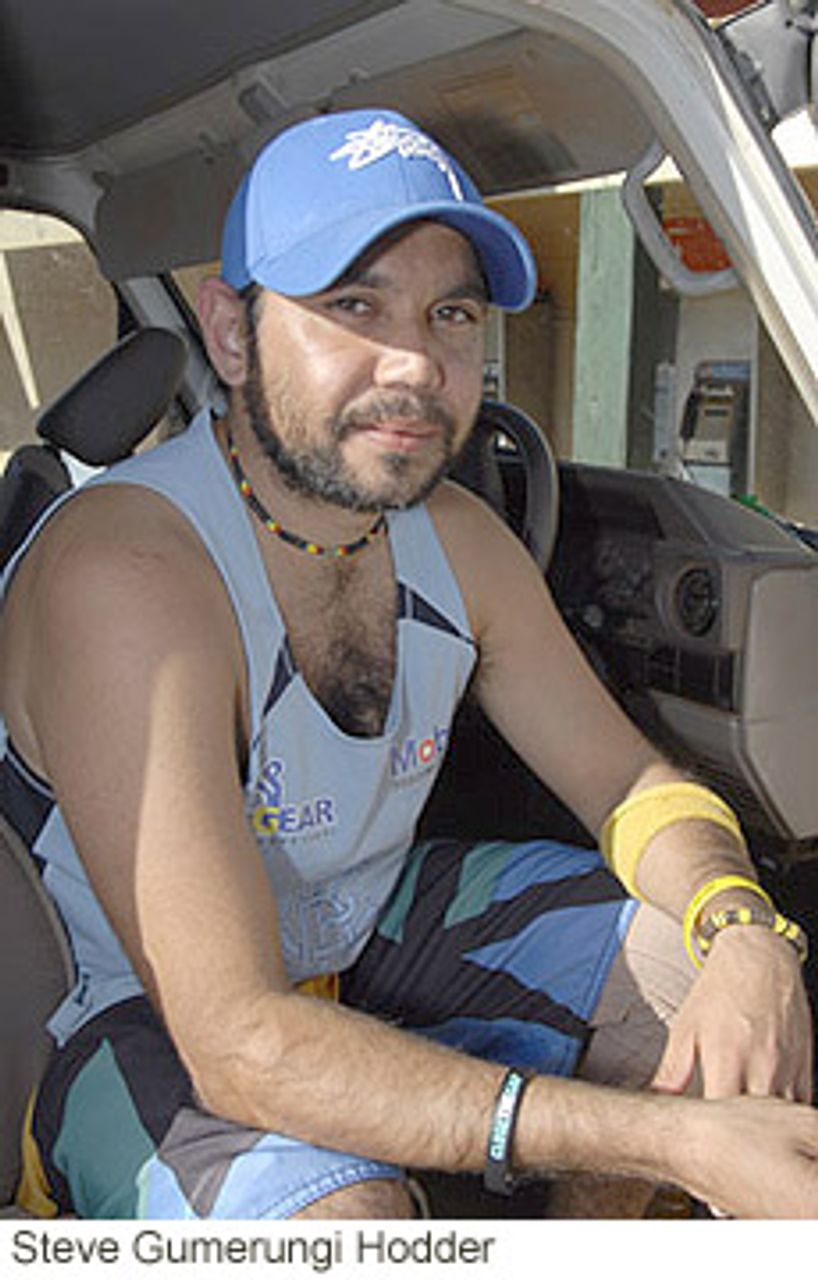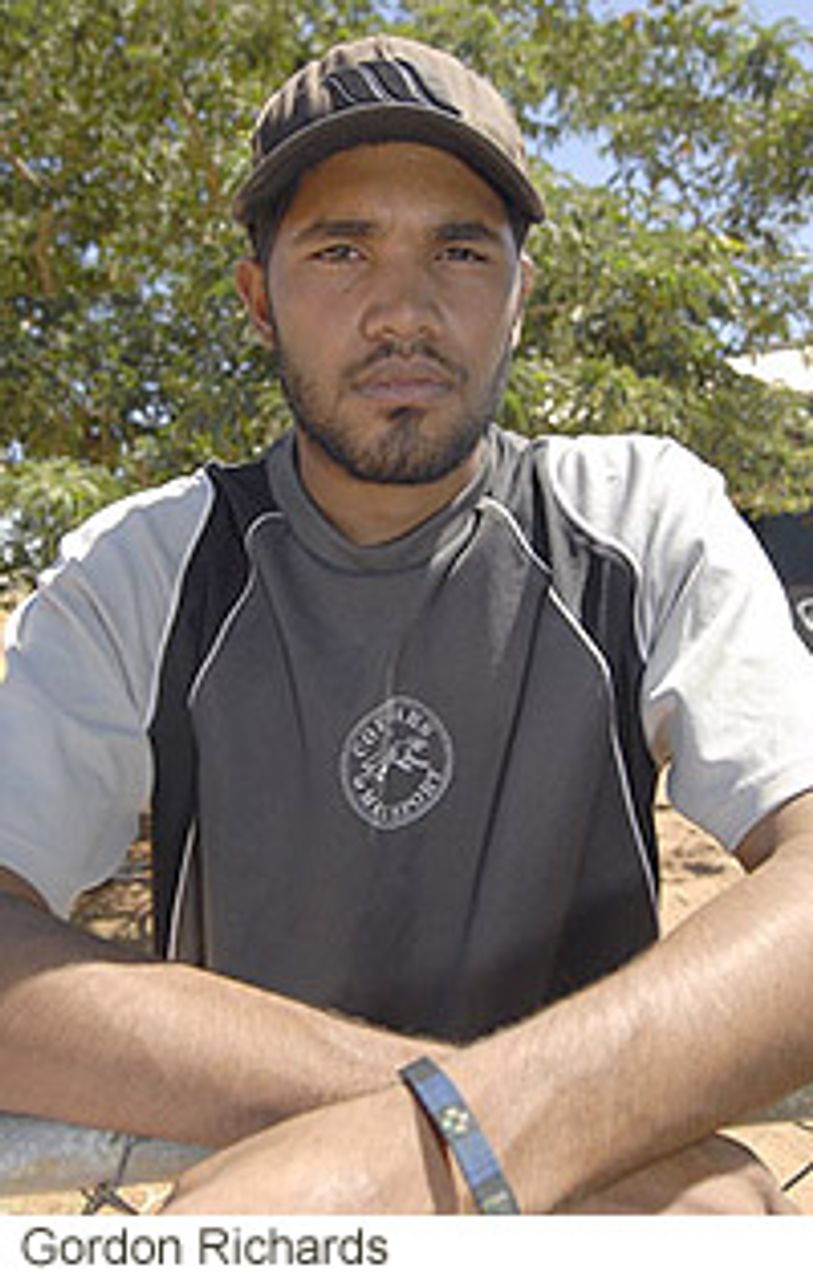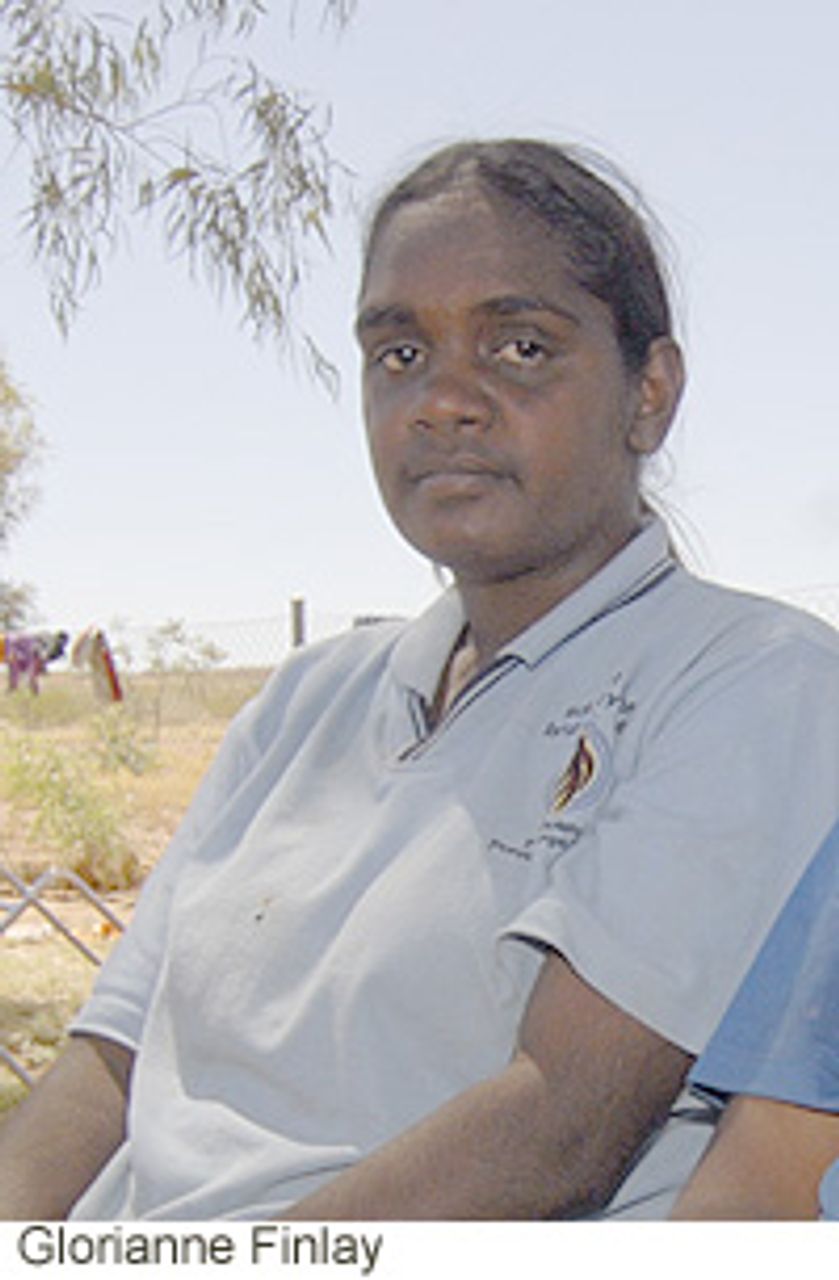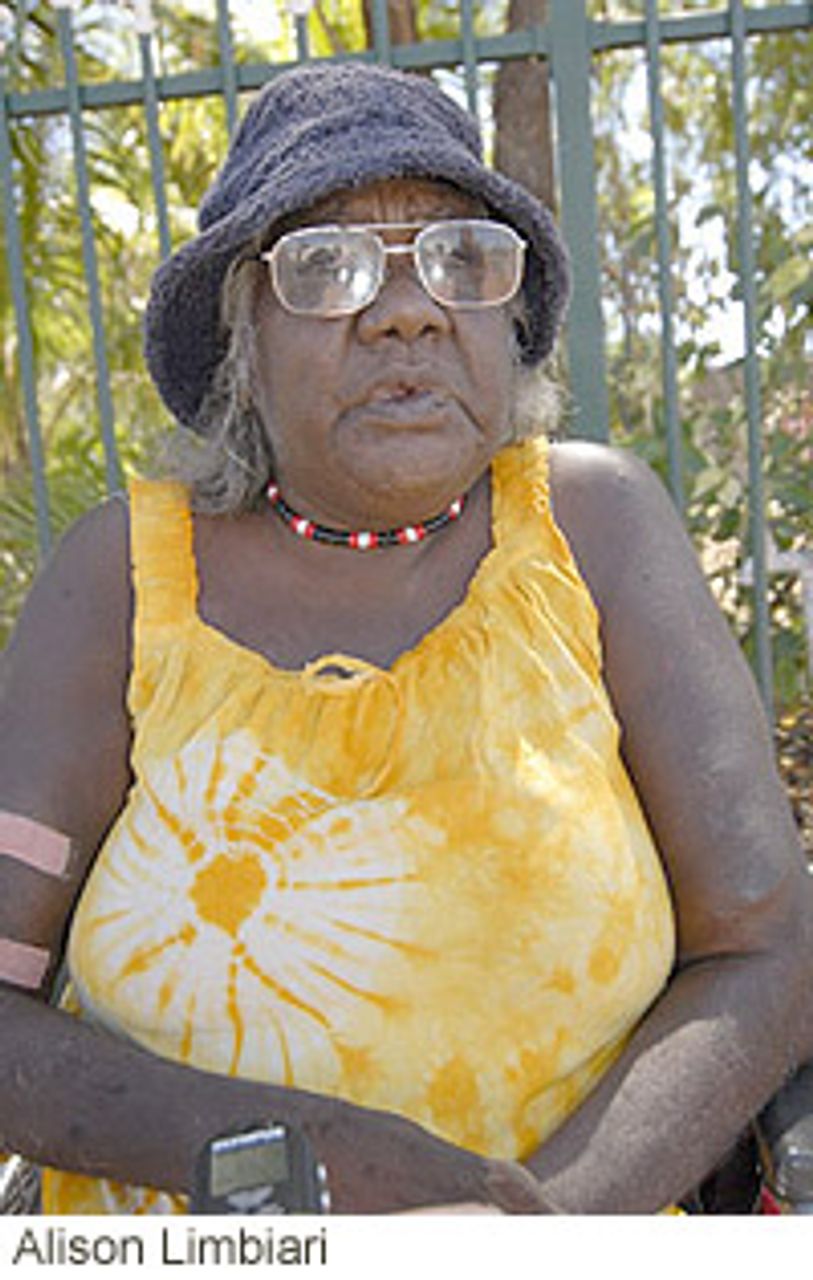World Socialist Web Site journalists Susan Allan and Richard Phillips and freelance photographer John Hulme recently visited central Australia to report on the social and political impact of the federal government’s Northern Territory Emergency Response or police/military intervention into Aboriginal communities. This is the fifth in a series of articles, interviews and video clips. Parts one, two, three, four, six and seven were posted on June 21, June 26, July 2, July 15, August 6 and August 25 respectively. Click for video interviews one, two, three and four.
The national media has played a pernicious role in the NT intervention, and its response to the first anniversary last month was no exception. Television networks dutifully regurgitated Rudd government “concern” about Aboriginal children and the print media published thousands of words claiming there was popular support for the retrogressive measures.
While the press could not ignore the June 21 anti-intervention protests, the coverage was hostile and perfunctory. In fact, there has never been serious reportage by the corporate media of the widespread opposition in Aboriginal communities to the government measures. The concerns of ordinary Aboriginal people—especially those who have been directly affected—are either ignored or censored, ensuring that most Australians have no idea what is really going on in the NT.
There is, however, significant and deeply-felt hostility to the intervention amongst Aboriginal people. A few minutes’ discussion in the Alice Springs town centre or outside the government’s Centrelink welfare agency makes this only too clear.
Those we spoke with directly condemned the intervention as a “land grab” and wanted to know why they were being “treated like second class citizens”. No one believed the measures had anything to do with “protecting” children. Older Aboriginal people referred to the 1967 referendum, which secured citizenship for indigenous Australians, and then pointed out that the intervention had virtually torn up and thrown back these rights in their faces.
“We have the right to vote but the government only gives us half our welfare money in cash and then tells us where we have to shop,” one Aborigine told us. Another said the intervention made him feel like “a prisoner in my own country”.
These concerns are quantified in a recent Darwin community group survey. Eighty-five percent of Aboriginal people questioned opposed the intervention outright; 83 percent opposed Centrelink income management store-cards and 59 percent said they were experiencing problems trying to access these cards. The survey also noted, however, that many Aborigines were reluctant to complain to Centrelink welfare authorities about income management and other measures because they feared further discrimination from the authorities.
Another of the many indicators of the depth of opposition was an angry letter published in Alice Springs News during our visit. The author was Bob Bagnell from Elliot, a small town of about 600 people, 750 kilometres north of Alice Springs. Bagnell is president of the local council and had originally backed the intervention, hoping it would improve housing in the local Aboriginal town camps. These hopes were quickly dashed.
As his letter explained: “Kevin Rudd, in the election campaign promised consultation would be the key to the Northern Territory intervention ... [but] since late January we have seen a procession of bungling bureaucrats descend on Elliott, making vague, contradictory statements that were never going to come to fruition ...
“The intervention has delivered absolutely zilch to the people of Elliott. Overcrowding of houses continues to contribute to poor health, education and social issues. If the thrust of the government measures is urbanisation and the demise of small, proud towns, they are on the mark.”
We phoned Bagnell who didn’t beat around the bush. The intervention was “a disaster”, he said, because it was “breaking up small communities throughout the Territory”.
“We already had liquor restrictions in Elliot,” he continued, “and so we didn’t need the government to come in and tell us about alcohol problems. Of course there are exceptions, but Aboriginal people in Elliot manage their money responsibly and feed and clothe their families as best they can. Then all of a sudden the government comes along and says we’re going to take half your money and tell you how to spend it. It’s a bloody insult.”
In Alice Springs we also made contact with Steve Gumerungi Hodder, an actor, hip-hop poet and radio journalist whom we first met in Canberra during the anti-intervention protest last February.

Rodney Barnes, an Aboriginal from Tennant Creek, 500 kilometres north of Alice Springs called in and, although we only had two more days in NT, we decided to visit him and get a sense of conditions in his town. Steve organised a four-wheel drive and we left that day, arriving in Tennant Creek late at night.
Tennant Creek
Tennant Creek, which is located in the Barkly Tablelands and is a beef cattle and gold mining area, has about 3,200 people, with just under half of these of Aboriginal descent. The town was set up in the 1930s and has a strong frontier feel, with a wide main-street featuring a string of shops and a few hotels on each side. According to local legend, Tennant Creek was established at the spot where a beer truck broke down. It has eight Aboriginal town camps, but little employment for local Aborigines and only limited social services.
While the federal government has made much of its intervention alcohol bans, Aboriginal and non-Aboriginal residents in Tennant Creek had already waged a unified battle against the destructive influence of grog in the town.
In fact, the struggle against liquor distributors and local authorities, which is powerfully documented in Aboriginal author Alexis Wright’s book Grog War, took ten years to just secure a few minor alcohol restrictions in the town. But these measures eventually produced a reduction in alcohol consumption, a decline in hospital admissions related to alcohol abuse and a drop in the number of people taken into police custody.
Wuppa
We only had a few hours in Tennant Creek, but made the most of it. After interviewing Rodney Barnes, who explained his opposition to the intervention, his early years on a cattle station and his hopes about the 1967 referendum, we visited Wuppa, one of the camps on the outskirts of town.
Housing in Wuppa is rudimentary and in urgent need of maintenance.
Last August, the local Aboriginal leadership of Julalikari Council in Tennant Creek agreed to relinquish their control of all the outlying town camps via a 99-year lease. The agreement was in exchange for a federal government pledge to provide $30 million in infrastructure upgrades. While camp housing is now under the control of the NT government, none of the residents we spoke to in Wuppa expected anything to come from these promises.

Richards, whose wife was expecting their first child, hoped to get a job on a cattle station. “My uncle works on a station and he said that there might be work fencing or something like that. I’m worried about how my wife will cope with Centrelink income management and store cards while I’m away. We have the right to welfare, but Centrelink says we have to spend it the way they want and they’re always very slow to pay up.

“The police think that they’re the boss of the whole town,” she said. “They came into Wuppa a while ago because they wanted to lock someone up. There was an argument and they jerked a man to the ground and tried to take him to the paddy wagon. He refused to go and so they just dragged him along the ground. This rough treatment really upset his mother but the police ignored her. She started throwing stones and so they came over and pepper-sprayed her.”

Alison explained that she wanted to spend the last years of her life in Ali Curung, a small settlement 170 kilometres further south, but had been forced to live in a Tennant Creek town camp because there were no dialysis facilities in Ali Curung. She then told us the names of four other relatives with ESRD, who also needed dialysis. Almost half of all indigenous ESRD patients in the Northern Territory come from regions without dialysis or transplant facilities.
“How can you save the children by quarantining welfare”
During our six-hour trip back to Alice Springs, Steve Gumerungi Hodder told us much about the country through which we were passing and his personal background. Steve’s mother was born in England and is an active opponent of the NT intervention. His father is from the Lardil people on Mornington Island in the Gulf of Carpentaria. The next day, back in Alice Springs, we asked Steve about his initial reaction to the government’s intervention announcements last year.
SGH: My first thoughts were, “Oh god, it’s a military invasion” and I pictured a stereotypical standoff with warriors standing in line at the gates of their communities waiting for the cavalry to roll in. This image stayed with me for a while because there was no government consultation or communication.
WSWS: I understand that in some remote communities, families picked up their kids and went bush.
SGH: Yes. People can argue this was blowing things out of all proportion, but there is the old saying “walk a mile in my shoes”. What would be the response of non-indigenous people if they were told that their children were going to be checked by medical officers for sexual interference?
It was a bit of an emotional roller coaster and one hell of a kick in the guts. The government didn’t say it was going to be for certain communities, they just said that it would apply to all Aboriginal people in the Northern Territory. I said to myself, “No way am I going to let anyone put their hands on my children. I’ll fight them to the end on this. I’m not going to have anyone dictate terms to me.”
I’m pretty lucky in many ways—I’m educated and have some backing—but imagine what it was like for people that didn’t have anything to fall back on. How can you save the children by quarantining welfare and not providing services to make their health better? You’d think the priority would be to get services that haven’t been there in the past or barely existed.
WSWS: Aboriginal people voted overwhelming for Labor in the last elections—99 percent in some NT communities. What did you think about Labor extending the intervention?
SGH: I need to correct you there slightly. There were a hell of a lot of votes for Labor but this was a vote against John Howard and Labor needs to take this into account. It’s not about them having friends in the bush; it’s about them paying attention to people in the bush who don’t want laws overruling their rights.
We’ve had politicians stand next to Aboriginal people and complain about the Howard government but once they get into power it all changes. Suddenly the Aboriginal fellah looks around and these politicians have gone—they’ve done a bolt. There’s plenty of frustration with Labor from people who are politically aware, but also a general misunderstanding amongst Aboriginal and white Australians about what is really going on.
WSWS: Labor’s “sorry” speech was the next major political event. But you went to Canberra to protest the intervention.
SGH: Although I don’t live in a prescribed area I spoke alongside delegations from the town camps and communities affected by the so-called emergency response. I felt it important to speak up. And although I’ve been told that I shouldn’t say that people are being treated like animals, because it supposedly turns people away, how else can you describe what’s going on here?
The government knew months in advance about our rally against the intervention and so they chose to make their long-overdue statement about the Stolen Generation the next day. So we had an apology for a past wrong the day after complaints from Aboriginal people and their supporters about a current wrong. This was the bitter-sweet part of it.
The ignorant media, of course, always focuses on the visuals—someone in the lap-lap carrying a smoking coolamon or some stereotypical image of the primitive people that they think we are. So on the day of the rally the media got the protest visuals, but didn’t talk to anyone about their actual experiences with the intervention. Everyone thought we were all there for the apology, which wasn’t the case. We were there to try and fight the current battle, not the past one.
WSWS: We’ve explained that the intervention is part of a broader assault on working people as a whole. How would you respond to that?
SGH: I remember you telling me that in Canberra. It was an interesting point and I held my breath to see where it would go. More and more information is now filtering out about this and it’s true, because there have been many occasions when Aboriginal people were used as guinea-pigs for policy engineering.
It’s easy to pick on people who can’t protect themselves politically, financially, socially or through the media. The government can do it because its buddies in the mainstream media can treat white Australians like puppets on a string. Why does mainstream Australia always seem to pick on the little guy and then promote itself internationally as ‘the land of the fair go’? This is a bit like America and hypocritical.
WSWS: Where do think this is all heading?
SGH: I think it’s heading backwards, big time. The government is cutting welfare and cracking down grog and pornography, but I don’t know how you are supposed to do this with big blue government signs. Where are all the services that are needed to close the life-expectancy gap and strengthen Aboriginal people mentally, physically and intellectually? And now they’re talking about boarding schools, dormitories, missions and that sort of thing. This is going back to the sort of policies that put us in this situation in the first place. I don’t like where it’s heading. It’s like apartheid or Queensland several decades ago.
WSWS: And your message to workers in Sydney, Melbourne and throughout the world?
SGH: Aboriginal people are criticised on varying levels—the men were demonised as child sex abusers, especially in central Australia, by Nanette Rogers and the “Lateline” program. But what about stepping back? There’s a lot of generalising about Aboriginal people, but we’re just as diverse financially, intellectually and socially as everybody else and we’re not “the missing link” as some tour guides might like to say we are.
We have the right to our cultural integrity. I don’t know whether that’s set in stone or in the law but it should be because Aboriginal culture is the original culture of this country. The government sells us to the tourists and yet they don’t want to back up that integrity.
I’m an Aboriginal man who was disconnected from his culture at a young age. I received a mainstream education, went to a decent private school in Alice Springs and even boarded there. I tried to get glimpses of my culture but I missed that and never learnt the language of my people. I’ve got a mortgage, fulltime employment and a wife that works and two children, one of whom is in the top two percent for literacy in the Territory. But what am I given back by this country for being an Aboriginal who has succeeded?
We’re always told that we get this or that, but we get nothing. The government needs to give us a chance—they need to give something back to our people. I’m aware that Aboriginal people have to step up to the plate. We need to be educated the mainstream way, but it shouldn’t be like me where I lost my culture. The onus is also on mainstream Australia to be educated about our culture instead of running us down and then walking over us.
How does it help the working class for the government to put a stranglehold on the limited income that poor people already get? And if workers remain silent while this sort of thing is happening, then they will be next.
WSWS: What do you think of our approach and our analysis?
SGH: It’s a breath of fresh air and strengthens me to know that there are people who are passionate to hear what is actually going on. Unlike the mainstream media, which espouses some line to back up its buddies with big pockets, you’ve come here to talk to people on the ground and not just to those who are outspoken.
To be continued
